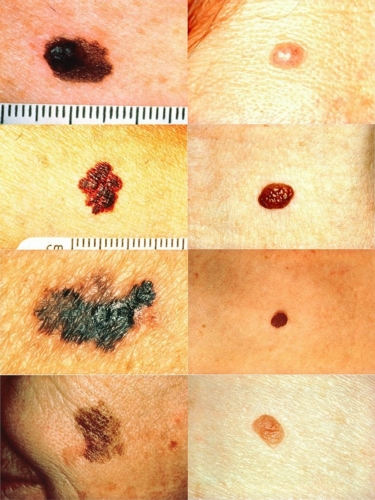Scientists have discovered what triggers one of the most deadly types of breast cancer, raising hopes of new treatments for it.
They have pinpointed a gene that drives triple-negative breast cancer – an especially fast-growing and hard-to-treat form of the disease.
It accounts for up to one in five cases of breast cancer and is particularly likely to strike women when they are still in their 20s and 30s.

Scientists have discovered a gene which drives a fast-growing, aggressive form of breast cancer.
Breast cancer drugs from the gold-standard treatment tamoxifen to ‘wonder drug’ Herceptin are useless against it and it has a worse prognosis than other forms of the disease. Continue reading


 If only old people would just hurry up and die — that’s the point of view for most proponents of socialized medicine around the world. Case in point is British doctor Richard Smith, who says
If only old people would just hurry up and die — that’s the point of view for most proponents of socialized medicine around the world. Case in point is British doctor Richard Smith, who says  The system for researching new cancer treatments is ‘broken’, one of Britain’s top academics has claimed.
The system for researching new cancer treatments is ‘broken’, one of Britain’s top academics has claimed. A glass of red wine, a handful of peanuts or a nibble of chocolate could protect against osteoporosis.
A glass of red wine, a handful of peanuts or a nibble of chocolate could protect against osteoporosis. Artificial sweeteners may disrupt the body’s ability to regulate blood sugar, causing metabolic changes that can be a precursor to diabetes, researchers are reporting.
Artificial sweeteners may disrupt the body’s ability to regulate blood sugar, causing metabolic changes that can be a precursor to diabetes, researchers are reporting. At this time of year, we have so much to be merry about. In the last couple of decades, there has been enormous progress in medical treatments, and as a result several of my friends are still alive who surely would have died amid the technology of yesteryear. Every invention of a new medical procedure, every discovery of a new medicine, is an example of what God gives to mankind – the gifts of intelligence, insight and creativity. It’s way too easy to overlook what that kind of progress means to all of us and our families.
At this time of year, we have so much to be merry about. In the last couple of decades, there has been enormous progress in medical treatments, and as a result several of my friends are still alive who surely would have died amid the technology of yesteryear. Every invention of a new medical procedure, every discovery of a new medicine, is an example of what God gives to mankind – the gifts of intelligence, insight and creativity. It’s way too easy to overlook what that kind of progress means to all of us and our families.  As health officials scramble to explain how two nurses in Dallas became infected with Ebola, psychologists are increasingly concerned about another kind of contagion, whose symptoms range from heightened anxiety to avoidance of public places to full-blown hysteria.
As health officials scramble to explain how two nurses in Dallas became infected with Ebola, psychologists are increasingly concerned about another kind of contagion, whose symptoms range from heightened anxiety to avoidance of public places to full-blown hysteria. Women with breast cancer do not increase their survival chances by having a double mastectomy, researchers claim.
Women with breast cancer do not increase their survival chances by having a double mastectomy, researchers claim. A new report shows that three of the top preventable risk factors for cancer have to do with what we eat and how often we move.
A new report shows that three of the top preventable risk factors for cancer have to do with what we eat and how often we move. The left column shows examples of melanomas. The right column shows examples of normal moles. These examples are not comprehensive, and you should have a dermatologist take a look at any moles you’re concerned about.
The left column shows examples of melanomas. The right column shows examples of normal moles. These examples are not comprehensive, and you should have a dermatologist take a look at any moles you’re concerned about. Has there ever been a nation more hooked on drugs than the United States? And I am not just talking about illegal drugs – the truth is that the number of Americans addicted to legal drugs is far greater than the number of Americans addicted to illegal drugs. As you will read about below, more than 30 million Americans are currently on antidepressants and doctors in the U.S. wrote more than 250 million prescriptions for painkillers last year. Sadly, most people got hooked on these drugs very innocently. They trusted that their doctors would never prescribe something for them that would be harmful, and they trusted that the federal government would never approve any drugs that were not safe. And once the drug companies get you hooked, they often have you for life.
Has there ever been a nation more hooked on drugs than the United States? And I am not just talking about illegal drugs – the truth is that the number of Americans addicted to legal drugs is far greater than the number of Americans addicted to illegal drugs. As you will read about below, more than 30 million Americans are currently on antidepressants and doctors in the U.S. wrote more than 250 million prescriptions for painkillers last year. Sadly, most people got hooked on these drugs very innocently. They trusted that their doctors would never prescribe something for them that would be harmful, and they trusted that the federal government would never approve any drugs that were not safe. And once the drug companies get you hooked, they often have you for life. An eye doctor says he’s recently seen a few 35-year-old patients whose lenses, which are typically clear all the way up until around age 40, are so cloudy they resemble 75-year-olds’. A sleep doctor says kids as young as toddlers are suffering from chronic insomnia, which in turn affects their behavior and performance at school and daycare. A scientist finds that women who work night shifts are twice as likely to develop breast cancer than those who sleep at night.
An eye doctor says he’s recently seen a few 35-year-old patients whose lenses, which are typically clear all the way up until around age 40, are so cloudy they resemble 75-year-olds’. A sleep doctor says kids as young as toddlers are suffering from chronic insomnia, which in turn affects their behavior and performance at school and daycare. A scientist finds that women who work night shifts are twice as likely to develop breast cancer than those who sleep at night. Emil Oprisa describes himself as someone who once was the “embodiment of laziness,” not doing much more than eating junk food and taking a taxi just to go to the grocery store down the street (1). Eventually, his six-foot frame was carrying around an unhealthy 328 pounds.
Emil Oprisa describes himself as someone who once was the “embodiment of laziness,” not doing much more than eating junk food and taking a taxi just to go to the grocery store down the street (1). Eventually, his six-foot frame was carrying around an unhealthy 328 pounds.